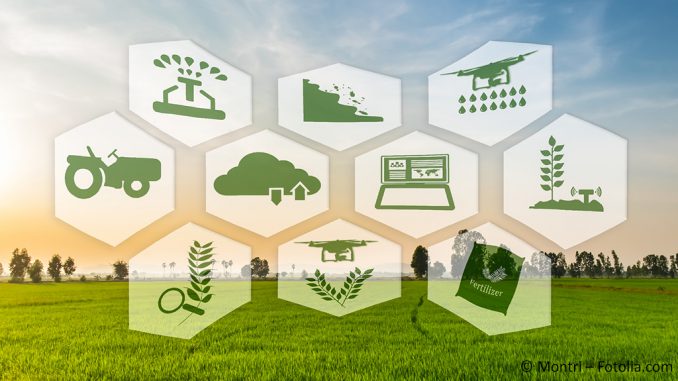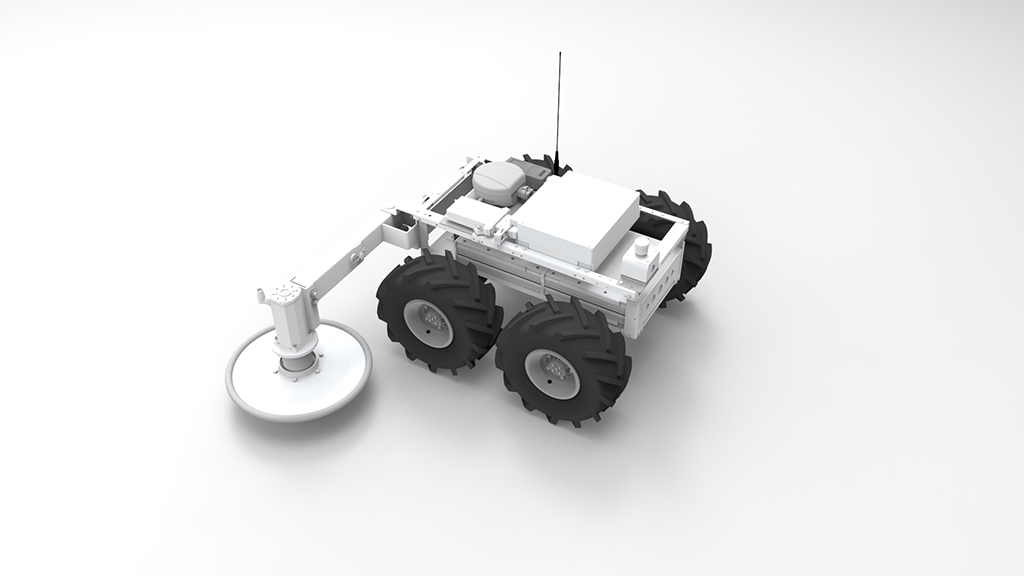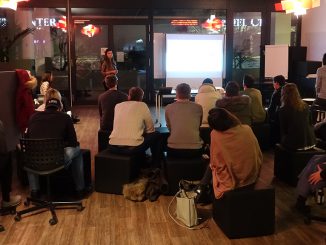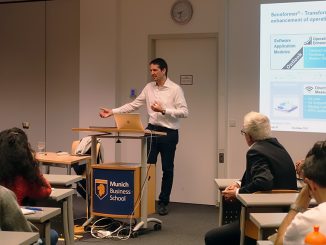
Agriculture has been changing dramatically over the past few decades: more and more farmers have been using sensors, GPS and big data analysis to work more efficiently, resulting in agriculture steadily being digitized.[1] This “Agriculture 4.0” makes it possible to work in a resource-efficient manner and at the same time promotes transparency. According to a study by Bitkom, Germany’s digital association, which was conducted in cooperation with the German Farmers’ Association, one in two farmers already integrates digital solutions into their workflows.[2]
The Bachelor thesis of Sophie Maria Marschall Carreras deals with viticulture, a specific application area of digital technology in agriculture.
In viticulture, the under-vine is the area between a vine stock and its neighboring vine stock. In this area, grass is growing, and has to be removed. The under-vine can be cleaned manually by using a string trimmer or a scythe; another way to remove the grass is to equip a tractor with a rotary brush or similar equipment, however, if it is not used precisely, the vine stocks might be damaged.
A solution for time-consuming under-vine care would be an autonomously moving lawnmower robot, which would remove the grass using a blade. It would be the most economical, ecological, and time-saving option. Such a robot does not require supervision, but acts autonomously; it only requires an initial investment.

Customer Requirements and Technical Characteristics
The objective of Sophie Maria Marschall Carreras’ Bachelor thesis was to identify possible customer requirements for such a lawnmower robot. Initially, she conducted a market analysis as part of a market research; subsequently, the customer requirements were translated into technical characteristics via Quality Function Deployment. This process enabled her to create a clear picture of customer requirements, their feasibility, and the competition on the market. The customer requirements became the framework conditions for the engineers during the development of a prototype.
The following research questions are part of the Bachelor thesis:
Research question 1: What are the market opportunities for an innovative lawnmower robot for under-vine care?
Overall, the worldwide vineyard surface area is slightly increasing. In 2014, Spain had the largest vineyard surface area in the world with 1,030,000 ha, followed by China with 799,000 ha, and France with 792,000 ha; Italy ranked fourth with 690,000 ha, Germany 14th with 102,000 ha.[3] It is worth mentioning that the consumption and the import-export business of wine are also increasing, according to the Organisation de la Vigne et du Vin (OIV).
Research Question 2: Quality Function Deployment is used to determine the framework conditions for the Fendt – AGCO Corporation lawnmower robot. Which requirements are decisive for the vintners, and how can they best be implemented?
Quality Function Deployment is a “customer preference oriented product planning matrix”.[4] The focus of Quality Function Deployment is on “customer orientation and the consistent transfer of customer needs to business processes”.[5]
In the House of Quality, an instrument of Quality Function Deployment, the customer requirements for the product are listed in detail, and rated with numerical values: 0-3-6-9 (0 is the worst value, 9 the best). The main function of the HoQ is to translate the voice of the customers, ergo their requirements, into the voice of the engineers, ergo the technical characteristics of the product. For the various customer requirements, functions, which are to meet those requirements, are developed. The different functions are rated with the above mentioned numerical values of 0-3-6-9; these are intended to show how influential the different functions are in fulfilling the requirements. This makes it possible to identify unnecessary functions, which in turn improves the product as the main focus is on those functions that are crucial for the customers.[6]
Another Successful MBS Connected Vehicle Lab Project
The Bachelor thesis by Sophie Maria Marschall Carreras is another successful result of the MBS Connected Vehicle Lab. The lab is a research and learning institution, driven by a core team of academia and industry participants, and based on trust and positive engagement. Student education is one of the core contributions of the MBS Connected Vehicle Lab; other forms of training are possible as well, such as executive education. The lab follows the principles of “Open Innovation”, which include “Action Learning” and “Case Based Research”; agile methods and approaches such as “Innovation Scrum” or “Lean Start-up” promote the activities. In addition, the MBS Connected Vehicle Lab aims to create transparency about the current situation of connected vehicle concepts to identify possible scenarios and roadmaps for further development, and to derive action areas and solutions for industrial partners.
[1] Anon. (2015). Intelligent Ackern. In: VDI Nachrichten. No. 45. November. p.1. Retrieved from: http://www.vdi-nachrichten.com/Technik-Gesellschaft/Intelligent-ackern.
[2] Anon. (2017). Jeder zweite Landwirt nutzt digitale Technologien. In: Macronomy.de. February. Retrieved from: https://www.marconomy.de/digital/articles/580875/.
[3] Organisation de la Vigne et du Vin (2016). Weltkonjunkturbericht. In: Organisation de la Vigne et du Vin. p.3f. Retrieved from: http://www.oiv.int/public/medias/4713/oiv-noteconjmars2016-de.pdf.
[4] Brunner, Franz J. (2014). Japanische Erfolgskonzepte. Ed. Brunner, Franz J., Munich: Carl Hanser. p. 3. Retrieved from: https://books.google.de/books?hl=de&lr=lang_de&id=RJ2lAwAAQBAJ&oi=fnd&pg=PR5&dq=Yoji+akao&ots=Nlh8e_dw1F&sig=gvoYe8RXjAwfxwPW4Pzbc1EGedg#v=onepage&q=Yoji%20akao&f=false.
[5] Zollondz, Hans-Dieter (2011). Grundlagen Qualitätsmanagement, Einführung in Geschichte, Begriffe, Systeme und Konzepte. 3rd edition. Munich: Oldenburg. p.131.
[6] Pfeifer, Tilo & Schmitt, Robert, (2014). Masing Handbuch Qualitätsmanagement. Munich: Carl Hanser. p.444ff.






